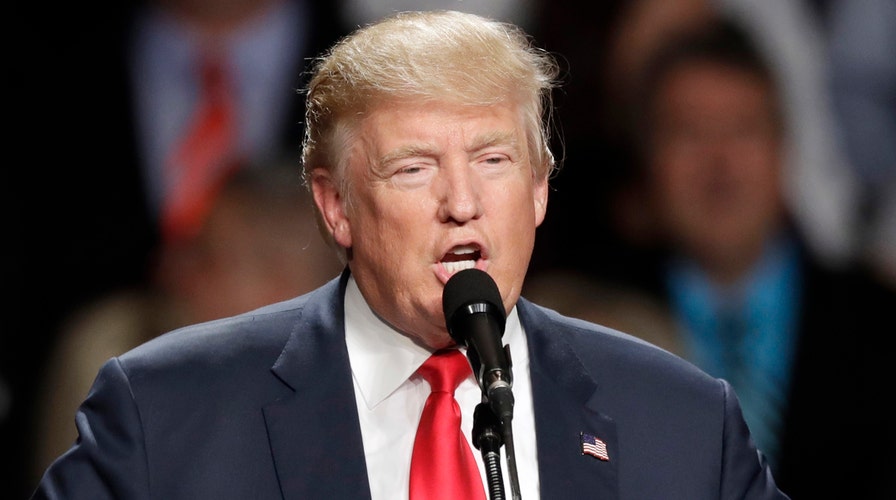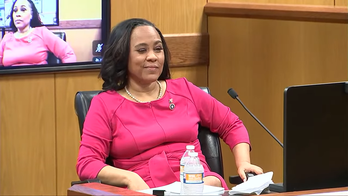Trump: Clinton wants complete gov't control of health care
Republican presidential nominee holds campaign rally in Valley Forge, Pennsylvania
Donald Trump and Mike Pence marked the start of ObamaCare open enrollment Tuesday by railing against the program's rising consumer costs and pledging to make repealing and replacing President Obama's signature health care law a first order of business if elected.
Trump, speaking in Valley Forge in the battleground state of Pennsylvania, called the Affordable Care Act a “catastrophe” that needed to be replaced immediately.
"I will ask Congress to convene a special session so we can repeal and replace," Trump vowed.
The running mates, already trying to energize supporters in the wake of the FBI's decision to revisit the Hillary Clinton email probe, used Tuesday's rally to draw attention to another October surprise -- the administration admission that premium rates on the ObamaCare exchanges will rise an average 25 percent next year.
Despite Trump's vow, a "special" session likely would not be necessary to address the law, since Congress already plans to reconvene after the election, and a new Congress would be in session by the time the next president is inaugurated.
The bigger question is whether there would be enough votes in this or the next Congress to do it. Republicans do not enjoy a filibuster-proof majority in the Senate and are at risk of losing seats next week. An increasing number of Democrats, though, have started to critique the law -- though their prescriptions often do not include repealing and replacing it.
While Trump talked about the issue in broad strokes, Pence delivered a detailed takedown of the law, highlighting the soaring costs of premiums across the country.
“I stand before you today because open enrollment begins,” Pence said. “Once again millions of Americans will be disappointed by the lack of options and shocked by premiums.”
Pence pitched getting rid of individual mandates “because government shouldn’t tell you how to spend your money” and said under Trump’s plan, Americans would be allowed to “purchase health insurance across state lines like life insurance.” They’d also create a transition period for subsidies to make sure there are no disruptions or hardships in coverage, he said.
Pence also took the president to task for recently comparing ObamaCare to Samsung phones.
“My favorite quote came from President Obama a week ago,” Pence said. “He was celebrating the anniversary of the rollout. In his speech he actually compared ObamaCare to Samsung Galaxy Phones that burst into flames. I’m serious.”
He added, “President Obama said quote, when one of these companies comes out with a smart phone with bugs, they fix and upgrade. Unless it catches fire, then they pull (it) off the market. Well, what a coincidence Mr. President. That’s what we are going to do with ObamaCare.”
Pence also slammed Clinton for the FBI's decision to investigate additional emails connected to the Clinton server probe, a review that could also cover her aide’s handling of classified information while Clinton served as secretary of state.
"We can't trust Hillary Clinton with our health care any more than we can trust her with classified information," he said. "ObamaCare was a catastrophic failure. Hillary Clinton says she wants to double down on that failure."
Pence himself has acted for and against the Affordable Care Act at different times. He railed against it while in Congress, but one of his chief accomplishments as governor was Indiana's expansion of Medicaid under Obama's health care law — a plan Pence called The Healthy Indiana Plan 2.0.
Tuesday’s speech fed off recent news by the Obama administration that the cost of mid-level plans will increase an average of 25 percent across 39 states next year. The jumps are even higher in certain states like Arizona, where one county will see a 116 percent increase over their average premium in 2016.
Tuesday also marks the start of open enrollment for the 2017 plans on the ACA’s public exchanges. The success of the open enrollment is vital for the future of ObamaCare.
Though Pence and Trump were quick to pounce on the news, they may be running out of time to change hearts and minds. With more than 23 million ballots already cast through early voting, Trump faces a steep climb in many battleground states.
The Republican nominee still faces a narrow pathway to winning the 270 electoral votes — one that includes defending states like Arizona and Utah that Republicans have won for decades.
The Associated Press contributed to this report.





